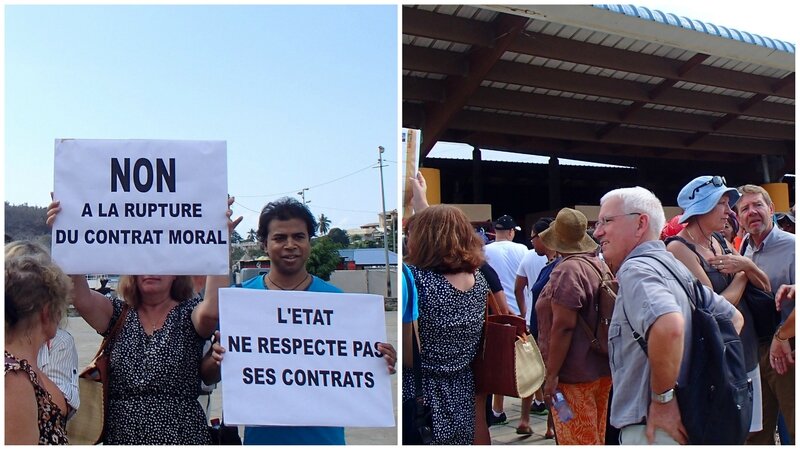Striking Teachers.
Before the school holidays, the French authorities started talking about their civil servants. Specifically the civil servants working overseas. As you already know, all French civil servants receive bonuses for working in the French overseas territories such as Mayotte, French Guyana or New Caledonia. These bonuses are calculated according to the civil servant's salary: at the start of your career, you get a 10,000-euro bonus, at the end of your career, you're closer to a 35,000-euro bonus. Per year, of course.
The official name of these bonuses is "Indemnité d'Eloignement", or "Distance Compensation". Living thousands of kilometres away from your home and family does indeed mean a lot of travelling and expensive plane tickets, which the bonuses are designed to make up for. Also, the cost of living is generally more expensive in overseas territories than it is in the mainland, mainly because everything is imported. People who live in such overseas territories are happy to have these bonuses. Some deliberately move to said territories because of the bonuses: maybe they have debts at home that they wish to pay off, maybe they want to make a down payment on a flat or a car, maybe they want to travel, maybe they want to give money to their children, maybe they are close to retirement and they want to have a big pension. Because in France, one's pension is based on the last ten years one works. And if in the last ten years, one has worked a in the French overseas territories, one's pension is based on a net salary of 75,000€ per year.
People who do not live in these overseas territories, however, rather resent those who do, because they are "getting paid thousands to live and work in the sunshine". But they do not wish to leave their families and friends, so it becomes a rather sterile debate after a while.
The bonuses are slightly different from one place to another, but Mayotte is one of the best places to receive such bonuses. You see, in Mayotte, the bonuses are tax-free.
Just before the holidays, the French government woke up to the fact that these bonuses were indeed free of tax and changed their mind about the whole thing, suddenly deciding that the civil servants would be taxed on their bonuses the same way as they are on their salaries. No special treatment: you've got the money, now you're going to pay taxes on it. Had it just been that, people wouldn't have minded so much. However, being French, they not only decided to tax the bonuses but to do so retroactively, thereby changing contracts that had already been signed and acted upon. The result of this was that we would have to pay taxes on the bonuses we received from 2013 onwards.
The civil servants, also being French, didn't like that very much and went on strike.
The main argument was that they didn't mind being taxed on the money they received, that was perfectly normal and posed no problems. What they didn't like was suddenly learning, two months after having signed their contracts, that they would have to pay a (rather large) portion of it back to the State. When you come to a place like this, you do so with certain criteria in mind. You know that you will receive a bonus and you make plans for that bonus. You do not make the same plans for 40,000 euros over four years as you would for 25,000 euros (tax deducted) over the same period, even if both are large sums of money. And so the problem was not so much the taxation itself as the retroactivity. This decision would especially affect people in their third year of service, which is my case, because in their first year, they got the first quarter of their bonus; in their second year, nothing; in their third year, the second and third quarters, and the fourth quarter on their return to France. So the third year is the year civil servants get the largest sum of money, which puts them into the next tax range up. Therefore, we stand to be taxed at 30% instead of 14%, thereby having to return several thousands of euros to the State. In my case, I would have to pay roughly 15,000€ in taxes for 2013.
That might give you a clearer idea of why the civil servants in Mayotte - teachers, police, hospital staff, soldiers, prison guards... - have been on strike since October 29th.
The strikers in my school came into the classrooms on Monday morning at 8 o'clock, after the first hour of lessons had finished, and gently shooed the students out of the school, telling them that lessons were over for today and that they should go home now. The teachers who were not on strike were directed towards the staff room, where the headmistress told them that they must stay in the school during their normal service hours and that they must warn her if they wished to go out of the staff room so that she could find them easily when the time came to check who was present. The Vice-Rectorate (high education authority in Mayotte) asked for regular presence checks, so the headmistress spent a lot of time running after everybody and calling people's names out.
This went on all week. When we arrived at the school at 7 a.m., we would spend about an hour and a quarter waiting outside, having found chains and antitheft devices on all the entrances. After an hour, the headmistress would be authorized to phone the police. The police would duly arrive, but as they were also civil servants in Mayotte, they would sympathize with the strikers rather than with the non-strikers. However, they would still ask the strikers to open the doors, which they would do. The non-strikers would then troop through the doors and up to the head's office, where we would clock in and then go to the staff room, where we would gaily proceed to do absolutely nothing for however many hours we were meant to be there. Any pupils would be turned away at the gates by the strikers.
A frustrating situation all round, really. From a non-striker point of view, we were stuck in the staff room. In the first couple of hours, we got anything useful that needed doing out of the way. We put in our marks, graded papers, laminated flashcards and drank tea and coffee. Once that was finished, there was nothing left to do. We couldn't work properly, as there is no Internet access in the staff room, six computers for eighty teachers and a lot of bored teachers sitting around chatting in loud voices. We couldn't really go to our rooms to work, as not all of us have keys and the maintenance staff hadn't opened the doors as there were no pupils. So we stayed put, clock-watching and becoming bored-er and scratchier as time went on. And of course, once our service hours had finished, we still had all our normal lesson preparation to do at home.
This has carried on for two weeks and hasn't finished yet. So far, the strikers have convinced the powers that be not to tax bonuses that have already been received. They are now striking to make sure no bonuses that come under their present contracts be taxed. As that doesn't seem likely, they've asked for the right to break their contract and leave Mayotte at the end of December. There are a lot of model letters going around for exactly that, basically saying: "As you've messed up my contract, I now inform you that I am leaving Mayotte", the idea being that if enough people send these in and do indeed leave Mayotte, the government will be a bit more careful next time they have a reform to make. The Mahorese answer to this so far has been: "Go ahead, don't let me stop you".
The non-strikers are not on strike because of one thing: decency. We're civil servants in a very poor country which just happens to be part of France. In this poor country, apart from the six thousand civil servants, roughly two hundred thousand people don't have enough to eat. Some of my schoolkids take their midday sandwich home to share with the family after school. We're employed, so it's normal to pay taxes on what we earn. Everybody, strikers and non-strikers, has already agreed on that. I understand not liking a change in contract halfway through and I fully sympathize with those who will have to take out credits to pay their taxes, but I also think we were lucky not to have to pay taxes on any bonuses received before 2012. Even if I do have to give several thousand euros back to the State, which I am indeed not looking forward to because I too had plans for that, there's still some bonus left. I'm not parading down the streets because of a discounted bonus when most of my kids come in hungry.
The funny part was on Friday 8th. When you are on strike, you lose your salary for that day. On a teacher's salary, that means losing roughly 80 to 100 euros per day of striking. If you are on strike on a Friday, you also lose your salary for the weekend. And that weekend happened to be followed by November 11th, a bank holiday in France, which was on a Monday. The strikers didn't want to lose four days of salary for the price of one day's striking, so all of a sudden, the strikers filled up the staff room and explained that they were no longer on strike... until the following Tuesday, of course.
On said following Tuesday, however, no fewer than seventeen policemen came to the school at 8 a.m. and cut the chains securing all the school entrances. Seeing that the school was open, a few kids came in, or saw teachers outside and asked if there were to be any lessons that day, were told that there were and please could they tell their friends. The result was eighty teachers with between zero and three students each, so we bundled the kids together and set the videoprojector up to watch a couple of cartoons in my classroom. From Wednesday onwards, however, students came in to the school in large numbers so classes were back up and running.
Meanwhile, the strike continued with those who wished. On Tuesday, 500 civil servants went to the airport with big bags of luggage to show what would happen if they left Mayotte the way they are threatening to. The slogan of the strike, you see, is "The State cheated me, so I'm going away". On Wednesday, they went to the prison to sympathize with the prison guards. And on Thursday, they made a human chain up to the Préfecture and demanded to see the Préfet.
On Friday, nothing happened... because they didn't want to lose their salary for the week-end!
Outside my school on Tuesday morning.









/http%3A%2F%2Fstorage.canalblog.com%2F74%2F16%2F886305%2F104399341_o.jpg)
/http%3A%2F%2Fstorage.canalblog.com%2F46%2F39%2F886305%2F105228464_o.jpg)
/http%3A%2F%2Fstorage.canalblog.com%2F48%2F20%2F886305%2F105197145_o.png)
/http%3A%2F%2Fstorage.canalblog.com%2F13%2F05%2F886305%2F104861776_o.jpg)
/https%3A%2F%2Fstorage.canalblog.com%2F34%2F27%2F886305%2F69902683_o.jpg)
/https%3A%2F%2Fstorage.canalblog.com%2F60%2F68%2F886305%2F69902677_o.jpg)
/https%3A%2F%2Fstorage.canalblog.com%2F88%2F49%2F886305%2F69902659_o.jpg)
/https%3A%2F%2Fstorage.canalblog.com%2F98%2F60%2F886305%2F69896713_o.jpg)
/https%3A%2F%2Fstorage.canalblog.com%2F53%2F34%2F886305%2F69883693_o.jpg)